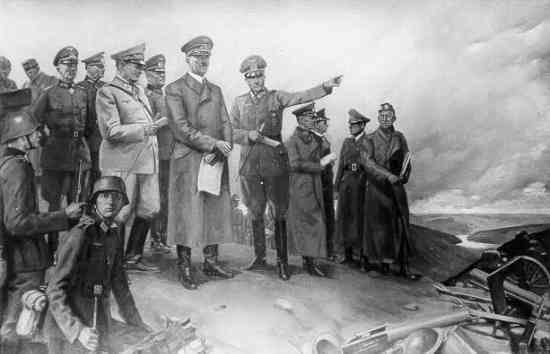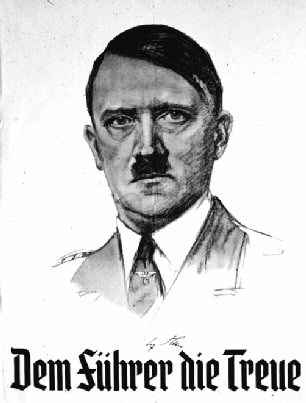Goering: The Führerprinzip

Justice Jackson: You are perhaps aware that you are the only living man who can expound to us the true purposes of the Nazi Party and the inner workings of its leadership?
Goering: I am perfectly aware of that.
Justice Jackson: You, from the very beginning, together with those who were associated with you, intended to overthrow and later did overthrow, the Weimar Republic?
Goering: That was, as far as I am concerned, my firm intention.
Justice Jackson: And, upon coming to power, you immediately abolished parliamentary government in Germany?
Goering: We found it to be no longer necessary. Also I should like to emphasize the fact that we were moreover the strongest parliamentary party, and had the majority. But you are correct, when you say that parliamentary procedure was done away with, because the various parties were disbanded and forbidden.
Justice Jackson: You established the Leadership Principle (Führerprinzip), which you have described as a system under which authority existed only at the top, and is passed downwards and is imposed on the people below; is that correct?

Justice Jackson: In other words, you did not believe in and did not permit government, as we call it, by consent of the governed, in which the people, through their representatives, were the source of power and authority?
Goering: That is not entirely correct. We repeatedly called on the people to express unequivocally and clearly what they thought of our system, only it was in a different way from that previously adopted and from the system in practice in other countries. We chose the way of a so-called plebiscite. We also took the point of view that even a government founded on the Leadership Principle could maintain itself only if it was based in some way on the confidence of the people. If it no longer had such confidence, then it would have to rule with bayonets, and the Fuehrer was always of the opinion that that was impossible in the long run -- to rule against the will of the people.
Justice Jackson: But you did not permit the election of those who should act with authority by the people, but they were designated from the top downward continuously, were they not?
Goering: Quite right. The people were merely to acknowledge the authority of the Fuehrer, or, let us say, to declare themselves in agreement with the Fuehrer. If they gave the Fuehrer their confidence, then it was their concern to exercise the other functions. Thus, not the individual persons were to be selected according to the will of the people, but solely the leadership itself.

Goering: I beg your pardon, I did not quite understand the question, but I could perhaps answer it as follows: I consider the Leadership Principle necessary because the system which previously existed, and which we called parliamentary or democratic, had brought Germany to the verge of ruin. I might perhaps in this connection remind you that your own President Roosevelt, as far as I can recall---I do not want to quote it word for word--declared:
Certain peoples in Europe have forsaken democracy, not because they did not wish for democracy as such, but because democracy had brought forth men who were too weak to give their people work and bread, and to satisfy them. For this reason the peoples have abandoned this system and the men belonging to it.







The Nuremberg Tribunal Biographies
Caution: As always, these excerpts from trial testimony should not necessarily be mistaken for fact. It should be kept in mind that they are the sometimes-desperate statements of hard-pressed defendants seeking to avoid culpability and shift responsibility from charges that, should they be found guilty, can possibly be punishable by death.
Disclaimer:The Propagander!™ includes diverse and controversial materials--such as excerpts from the writings of racists and anti-Semites--so that its readers can learn the nature and extent of hate and anti-Semitic discourse. It is our sincere belief that only the informed citizen can prevail over the ignorance of Racialist "thought." Far from approving these writings, The Propagander!™ condemns racism in all of its forms and manifestations.
Source Note: The trial portion of this material, which is available in its entirety at the outstanding Avalon and Nizkor sites, is being presented here in a catagorized form for ease of study and is not meant to supplant or replace these highly recommended sources.
Fair Use Notice: This site may contain copyrighted material the use of which has not always been specifically authorized by the copyright owner. We are making such material available in our efforts to advance understanding of historical, political, human rights, economic, democracy, scientific, environmental, and social justice issues, etc. We believe this constitutes a "fair use" of any such copyrighted material as provided for in section 107 of the US Copyright Law. In accordance with Title 17 U.S.C. Section 107, the material on this site is distributed without profit to those who have expressed a prior interest in receiving the included information for research and educational purposes. If you wish to use copyrighted material from this site for purposes of your own that go beyond 'fair use', you must obtain permission from the copyright owner.

